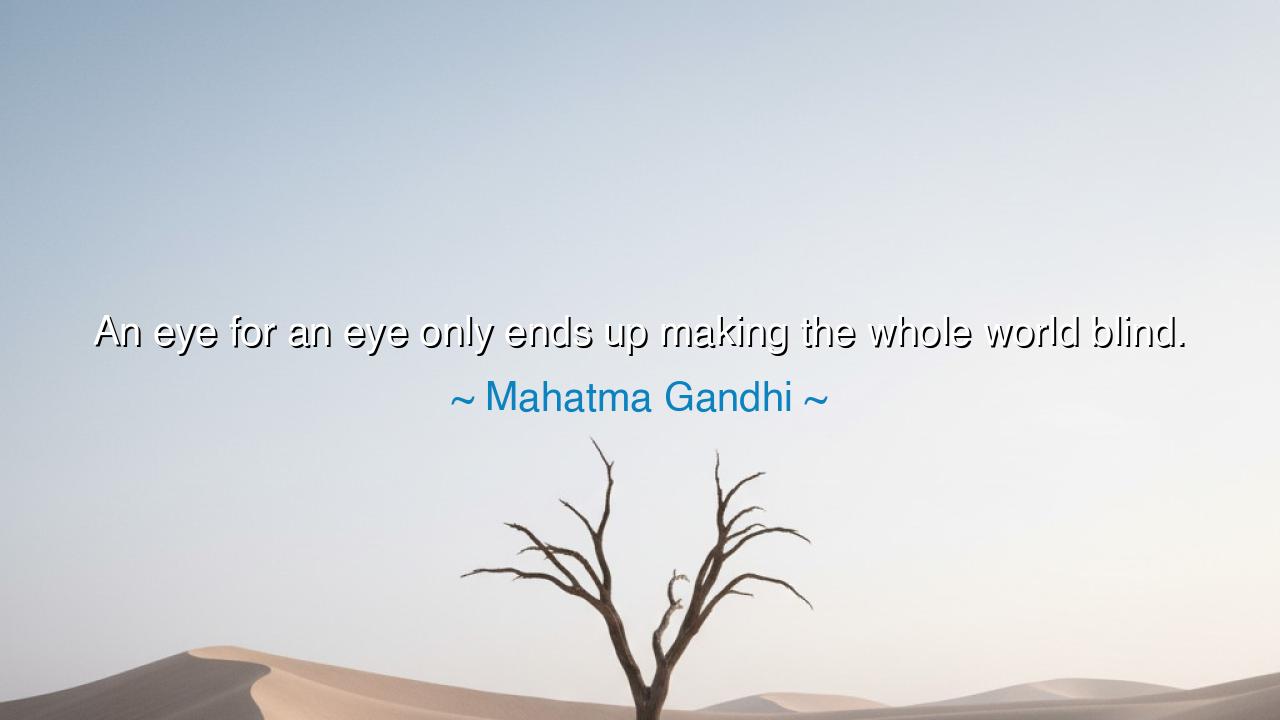
An eye for an eye only ends up making the whole world blind.






The words of Mahatma Gandhi — “An eye for an eye only ends up making the whole world blind.” — are like a bell tolling across the ages, calling humanity to awaken from the madness of vengeance. In them lies the eternal truth: that retaliation breeds only deeper darkness, that the cycle of hatred cannot be broken by feeding it, but only by refusing it. To strike back when struck may feel natural, even just, but Gandhi teaches that such justice is but illusion — for in the end, all are left wounded, and no sight remains to behold the light of peace.
The image of blindness is not chosen lightly. To lose an eye is to lose clarity of vision, to stumble through shadows. When vengeance consumes a people, it robs them of perspective, of wisdom, of compassion. Entire nations have been blinded by this fury, unable to see beyond old injuries, locked in endless feuds. Gandhi, who lived under the weight of British oppression, knew well the temptation of violence. Yet he also knew that to mirror the cruelty of the oppressor is to become enslaved not only in body, but in spirit. Thus he chose the path of nonviolence, that India might rise not in blindness, but in sight.
History has given us many grim examples of the eye for an eye principle played out to ruin. Consider the Hatfields and the McCoys in America — families locked in bitter blood-feud, answering each death with another, until generations were consumed by grief. What began with a single spark of conflict grew into a fire that devoured both clans, leaving no victor, only ashes. Such is the fate of all who cling to vengeance: the injury never heals, for every act of reprisal deepens the wound.
Yet there are also radiant examples of those who broke the cycle. When Nelson Mandela walked free after twenty-seven years of imprisonment, the world expected retribution. He had every reason to demand an eye for an eye, to unleash the fury of the oppressed against their tormentors. But instead, he chose reconciliation. He declared forgiveness not because the crimes were small, but because the future demanded vision, not blindness. By refusing vengeance, he kept South Africa from descending into civil war, proving Gandhi’s wisdom true on a grand stage.
The meaning, then, is this: vengeance may feel like justice, but it is in truth a poison, spreading blindness through the world. True strength lies not in striking back, but in rising above. To forgive is not to forget or excuse, but to refuse to chain the future to the hatreds of the past. It is the higher courage, the nobler heroism, the discipline of the spirit that sees beyond the immediate wound to the greater good.
The lesson for us is clear: in our own lives, when wronged, resist the urge to repay hurt with hurt. If insulted, choose not to insult in return. If betrayed, do not let bitterness rule your heart. Instead, seek understanding, forgiveness, or at the very least, the refusal to perpetuate harm. For every act of restraint plants a seed of peace; every refusal to strike back breaks a link in the chain of vengeance.
Practical actions may begin small: pause before responding in anger. Speak calmly where others shout. Forgive debts, release grudges, and remember always the blindness that vengeance brings. In homes, communities, and nations, let this teaching guide us: peace is preserved not by retaliation, but by mercy. Each act of forgiveness restores sight to the world.
So remember, child of tomorrow: the path of vengeance may seem strong, but it leads only to blindness. The path of mercy may seem weak, yet it is the vision that saves. Follow Gandhi’s wisdom — refuse the eye for an eye, and guard your sight, that you may behold the light of peace and lead others into its radiance.






AAdministratorAdministrator
Welcome, honored guests. Please leave a comment, we will respond soon